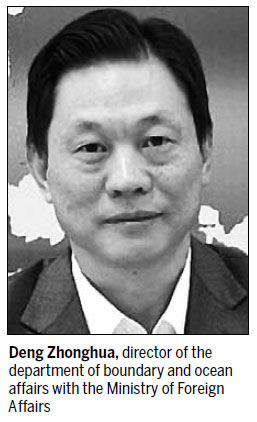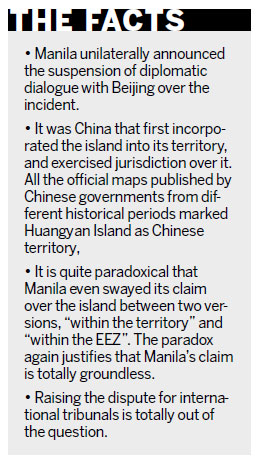China committed to solving island issue
Updated: 2012-05-14 08:04
(China Daily)
|
||||||||

Q+A: Deng Zhonghua
Editor's note: On April 10, a Philippine warship entered waters near China's Huangyan Island, dispatched personnel to harass Chinese fishing boats and acted violently toward Chinese fishermen, infringing on China's sovereignty and triggering a monthlong impasse between the two countries. Deng Zhonghua, director of the department of boundary and ocean affairs with the Ministry of Foreign Affairs, gave an exclusive interview to China Daily on Friday.
A whole month has passed since the Huangyan Island incident. What efforts has China made to resolve the incident? And what has the Philippines done?
In the wake of the incident, the Chinese government immediately lodged a strong protest and made a solemn representation to the Philippines, urged due respect for China's territorial sovereignty, required an immediate stop of any infringement on China's sovereignty and called for the withdrawal of Philippine vessels. China's official ships also ensured the safety of the Chinese fishermen.
The Philippines has claimed on several occasions that it was willing to resolve the situation with diplomacy, but over the past period, the Philippines has resorted to moves that only would escalate the tension and instigate rivalry.
Some Philippine senior officials, politicians and the servicemen have frequently made harsh and sometimes even irresponsible remarks trumpeting extreme nationalist sentiment in the country. The Philippine defense minister even called on Philippine citizens to support the government's confrontation with China. The Philippines connived to set up protests and demonstrations aimed at the Chinese embassy in Manila and encouraged its overseas citizens to launch more massive protests against China.
Manila unilaterally announced the suspension of diplomatic dialogue with Beijing over the incident.
In contrast to Manila's provocation and serious infringement on China's sovereignty and the Chinese fishermen's human rights, Beijing has been unswervingly seeking a diplomatic solution to properly address the situation. Beijing sent patrol ships, rather than warships, to the island's waters to safeguard China's sovereignty and Chinese citizens' safety, in a legal and civilized manner. Beijing has been reasoning with facts in its remarks, and has never made provocative and irresponsible remarks.
Can you brief us on the current situation in the Huangyan Island's waters?
Currently, the waters are relatively peaceful. China's patrol ships are there on a regular mission, and Chinese fishermen and fishing boats are operating without being disturbed.
Both sides have their claims over the island's sovereignty. A number of Chinese scholars have refuted Manila's claims in recent articles. Can you tell us more about China's stance?
There are two indisputable facts about Huangyan Island. First, Huangyan Island has been part of China's territory since ancient times, and many historical records can prove it. It was China that first incorporated the island into its territory, and exercised jurisdiction over it. All the official maps published by Chinese governments from different historical periods marked Huangyan Island as Chinese territory, and all the official ways of naming the islands in South China Sea by the Chinese government include Huangyan Island. Through Chinese government's legislative moves in history, China succeeded in naming the island and its adjacent islets in 1935, 1947 and 1983, which again justified China's sovereignty over the island.
The waters around the island have been a traditional fishery area for Chinese fishermen, and many generations of fishermen have been fishing there. Moreover, China often conducts activities such as scientific researches facilitated by radio equipment on the island.
It is also an indisputable fact that the Philippines, for a long period of time, admitted that Huangyan Island is not part of its territory. In 1990, the Philippine ambassador to Germany said in a letter to a German radio station that Huangyan Island is not part of the Philippines' territory. The letter represents the country's official stance. Moreover, the country's Department of Environment and Natural Resources in 1994 also made it clear in an official document saying Huangyan Island is not the Philippines' territory.
Manila's rival claim over the island started in 1997, yet even all its official maps issued since 1997, including the one published in 2006, did not include the island into its territory.
Since 1997, Manila has based its territorial claim over the island on the excuse that the island is within its 200-nautical-mile exclusive economic zone, which is not supported by any international laws, not to mention the United Nations Convention on the Law of the Sea. The convention has never authorized any country to use the country's definition of EEZ to infringe other country's territorial sovereignty. It is quite paradoxical that Manila even swayed its claim over the island between two versions, "within the territory" and "within the EEZ". The paradox again justifies that Manila's claim is totally groundless.
Manila has persisted in raising the so-called territorial dispute before international tribunals. What's your opinion?
Raising the dispute for international tribunals is totally out of the question. We noticed that some people in the Philippines said raising the issue was not a move related to jurisdiction, but a display of Manila's "sovereignty" over the island. So we believe their motive is to fabricate a territorial dispute, which seriously infringed on China's sovereignty. Raising disputes involving another country's indisputable territory to international tribunals not only violates the ground rules of contemporary international relations, but also seriously disrupts international order. If everyone acts like this, the world will be in utter chaos.
The international community has paid great amount of attention to the development of Huangyan Island incident. What's China's next step?
Chinese fishermen, like their generations of ancestors, will continue to operate in the waters around the island. Those fishermen's dignity and lawful rights deserve respect, and the safety of their lives and properties should not be threatened and their regular fishery work should not be disrupted or even banned.
China's official ships, according to related laws, will continue to provide administration and services for the fishermen's work. China again urges the Philippines to immediately withdraw all of its vessels operating on the waters of the island, and to not disrupt the operations of Chinese fishing boats patrol vessels.
Moreover, both countries are close neighbors, and are connected in history, culture and even in blood ties. Peoples of both countries enjoy a long history of friendship, which could be traced back to China's Tang Dynasty, about 1,400 years ago.
At present, both countries have close exchanges in many regards, such as economy, trade and culture. We have a thousand reasons to protect and deepen traditional friendship between us, not to resort to any excuse to damage it.
Therefore, on the basis of ensuring China's sovereignty, we will take greatest sincerity and patience to communicate the incident with the Philippine side, and we hope that the Philippines can also take China's concerns into serious consideration and get back on the correct track of finding a diplomatic solution.
China Daily

(China Daily 05/14/2012 page11)

 Relief reaches isolated village
Relief reaches isolated village
 Rainfall poses new threats to quake-hit region
Rainfall poses new threats to quake-hit region
 Funerals begin for Boston bombing victims
Funerals begin for Boston bombing victims
 Quake takeaway from China's Air Force
Quake takeaway from China's Air Force
 Obama celebrates young inventors at science fair
Obama celebrates young inventors at science fair
 Earth Day marked around the world
Earth Day marked around the world
 Volunteer team helping students find sense of normalcy
Volunteer team helping students find sense of normalcy
 Ethnic groups quick to join rescue efforts
Ethnic groups quick to join rescue efforts
Most Viewed
Editor's Picks

|

|

|

|

|

|
Today's Top News
Health new priority for quake zone
Xi meets US top military officer
Japan's boats driven out of Diaoyu
China mulls online shopping legislation
Bird flu death toll rises to 22
Putin appoints new ambassador to China
Japanese ships blocked from Diaoyu Islands
Inspired by Guan, more Chinese pick up golf
US Weekly

|

|






